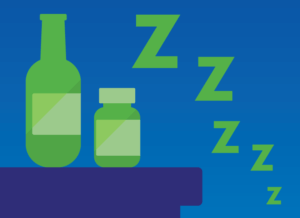Effect of Medications on Sleep
Aug. 7, 2018
Different medications affect sleep differently. For example, some medications, including those for high blood pressure and asthma, can keep you up all night with insomnia while others, like cough, cold, and flu medications, can disrupt sleep. And certain medications, such as antihistamines, can cause daytime drowsiness. In fact, sleepiness is one of the most common side effects of medications. This is the list of medications that affects sleep with a few examples:
- For heart rhythm: Anti-arrhythmics e.g. Amiodarone, Procainamide, Sotalol
- For high blood pressure
- Beta blockers e.g. Atenolol, Metoprolol, Propranolol, Nadolol
- Clonidine
- Diuretics e.g. Lasix, Microzide
- For inflammation or asthma: Theophylline and Corticosteroids e.g Prednisone, Bethamethasone
- For depression or anxiety SSRIs e.g. Prozac, Celexa, Paxil, Zoloft
- For hypothyroidism: Thyroid hormone e.g. Synthroid, Levothroid
- For colds and allergies: Sedating antihistamines and medications that contain alcohol
- Pain medications: Narcotics and medications that contain caffeine
- Nicotine replacement products
- For attention deficit disorder: Sympathomimetic stimulants e.g. Amphetamine
If you are on any of the medications that are listed and suspect that a medication is disrupting your sleep or causing you to feel drowsy during the day, talk to your doctor or pharmacist. He or she may be able to switch you to a different one that has a different side effect profile, reduce the dosage of your current prescription, or suggest a different type of treatment altogether so that your sleep isn’t affected.
What you shouldn’t do is attempt to solve the problem on your own. Always discuss the situation in depth with your doctor first, and don’t stop taking the medication until you have decided on an alternative treatment. If you are not on any of the above medications and you are experiencing sleep disturbance, contact Cansleep Services to do a sleep apnea diagnostic test.
By Bahareh Ezzati (BSc, CPhT, RRT)






